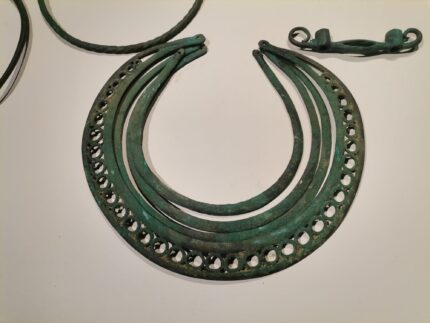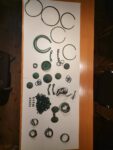 Two Bronze Age hoards have been discovered in western Poland in the past six months. The first was discovered on January 12th by a man and his son taking a walk in their hometown of Bogdaniec. They spotted a bronze bracelet poking out of the soil on a slope and notified regional authorities. The subsequent archaeological inspection of the site revealed a rich deposit of bronze objects from the Lusatian culture (1300 – 400 B.C.).
Two Bronze Age hoards have been discovered in western Poland in the past six months. The first was discovered on January 12th by a man and his son taking a walk in their hometown of Bogdaniec. They spotted a bronze bracelet poking out of the soil on a slope and notified regional authorities. The subsequent archaeological inspection of the site revealed a rich deposit of bronze objects from the Lusatian culture (1300 – 400 B.C.).
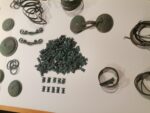 Found inside a broken vessel, the hoard consists of 220 bronze artifacts, among them six bracelets, five necklaces, round plates, a myriad rings and assorted mounts that are believed to have been part of a horse harness. The variety and quantity of the objects makes this a find of great archaeological significance.
Found inside a broken vessel, the hoard consists of 220 bronze artifacts, among them six bracelets, five necklaces, round plates, a myriad rings and assorted mounts that are believed to have been part of a horse harness. The variety and quantity of the objects makes this a find of great archaeological significance.
The second hoard was found 30 miles to the south of Bogdaniec by a farmer 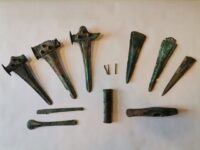 clearing rocks from his field in Sulęcin County on July 27th. He encountered the grouping of bronze objects just below the agricultural layer so they had never been exposed or damaged in previous field work. He wisely left the objects alone, secured the find site and informed the county conservation services the next day.
clearing rocks from his field in Sulęcin County on July 27th. He encountered the grouping of bronze objects just below the agricultural layer so they had never been exposed or damaged in previous field work. He wisely left the objects alone, secured the find site and informed the county conservation services the next day.
Archaeologists recovered three scepters, three bronze dagger points, a 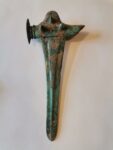 chisel, a hatchet and smaller associated metal objects from the Únětice culture which flourished in what are now Czech Republic, Slovakia, Germany and Poland between 2300 and 1800 B.C. Úněticean hoards, often found in funerary contexts, are characterized by metal objects, including axes, ingots, daggers, bracelets and spirals. Very rarely do Únětice hoards contain more than one dagger and one scepter, so this find is unique.
chisel, a hatchet and smaller associated metal objects from the Únětice culture which flourished in what are now Czech Republic, Slovakia, Germany and Poland between 2300 and 1800 B.C. Úněticean hoards, often found in funerary contexts, are characterized by metal objects, including axes, ingots, daggers, bracelets and spirals. Very rarely do Únětice hoards contain more than one dagger and one scepter, so this find is unique.
